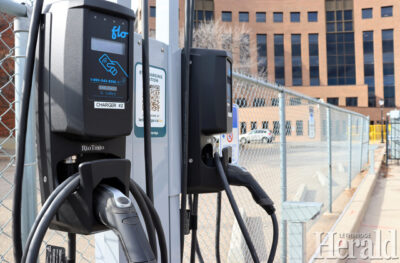Insurance rates no deterrent to buying an EV – yet
By Al Beeber - Lethbridge Herald on March 20, 2024.
 Herald photo by Al Beeber
Electric vehicle charging stations, some of the number that can be found around the city, are shown in the parking lot behind city hall.
Herald photo by Al Beeber
Electric vehicle charging stations, some of the number that can be found around the city, are shown in the parking lot behind city hall.LETHBRIDGE HERALDabeeber@lethbridgeherald.com
While the federal government has mandated all new vehicles to be sold in Canada in 2035 to be zero emissions, not everyone is jumping onto the electric bandwagon.
In 2023 roughly nine out of 10 new vehicle buyers were sticking with internal combustion rather than going the plug-in route.
In the first nine months of 2023, though, 132,783 new battery-electrics or plug-in hybrids were registered in Canada – for a total of 10.3 per cent of all new vehicle registrations. For 2024, the number of EV units expected to be sold is up to 139,000 units.
EVs are possibly more popular in B.C. than elsewhere with EV sales making up 26.4 per cent of all registrations there in the third quarter of last year. In Quebec, EVs were 22.8 per cent of sales.
As of March 2023, there were a total of 9,338 electric vehicles – not including hybrids – registered in Alberta.
For buyers who choose to go electric – with the average price in Canada last year being $73,000 per vehicle – costs of insurance may be one of many considerations that come into play before taking one home from a dealership lot.
Jennifer Krasic, an insurance broker with insuranceHotline.com says there really isn’t a difference between rates for EVs and regular vehicles.
“They’re basically in line with just your regular standard vehicles,” said Krasic in a phone interview this week.
And there are no additional surcharges, she said.
Krasic said because EVs are branded as being environmentally safe, consumers expect an insurance discount but if a vehicle is involved in a total loss – be it electric or gas-powered – the payout is basically going to be the same, if not more, because that will depend on the cost of the vehicle.
“So if you have a $40,000 vehicle and it’s a total loss in the event of a claim, the insurance company is still going to have to pay that out regardless of the type of vehicle it is in terms of electric or gas,” said Krasic.
“In terms of insurance, it’s not going to cost a consumer more or less to have an electric or hybrid type of vehicle,” said Krasic.
However, the Insurance Hotline website suggests that could change. A recent survey by credit rating agency Morningstar DBRS states that EV buyers in Canada “should expect to pay more for insurance when replacing internal combustion engine (ICE) vehicles with EVs. Insurers will also have to adjust their pricing models as more EV claims data are generated.”
MorningStar says EV owners in the United Kingdom are already facing higher rates and in some cases denial of coverage.
“Repairs and replacement parts for EVs are very expensive, prompting some insurers to total damaged vehicles instead of attempting to repair them,” says Morningstar noting that with vehicle insurance rates highly regulated in this country, that could mitigate the rate of potential rate hikes.
Provincial regulators also review and approve requests made by insurers to increase rates before they can be implemented,” said Victor Adesanya, Vice President, Insurance on Morningstar’s website.
“This could help mitigate the impact of insurance rate increases on the finances of EV owners on renewal or when an EV is registered for the first time. However, we expect that auto insurance rates will trend upward over time as insurers generate more claims data for EVs and reflect that experience in their pricing.”
EV buyers can forget about putting extra insurance on their battery packs, Krasic said.
“We wouldn’t insure specific parts like in terms of an endorsement. There is no endorsement that would extend the battery of the vehicle,” Krasic said.
Battery replacements range in price from $5,500 to $20,000 depending on model, says Insurance Hotline and they typically last between 10 and 20 years.
According to website ratehub.ca,insurance companies can face more financial risk if a damage claim is made because electric car parts can be more expensive to obtain. EV battery backs can can be difficult to repair or assess. Ratehub says a slight amount of damage might even have insurers inclined to write off a car completely.
And Krasic notes that potential contributors to EV insurance rates include costs such as replacement of batteries and other parts and finding certified repair technicians.
According to the Autotrader.ca website, EV owners save an average of $19,353 in fuel costs over a five-year period compared to a comparable gas-powered model. And the federal government provides buyers with a rebate up to $5,000 for eligible new battery electric vehicles and plug-in hybrids.
To qualify, the base model for passenger vehicles must have an MSRP below $55,000 but higher priced trims are eligible up to an MSRP of 65,000. The rebate limit for light trucks is an MSRP between $60,000 and $70,000.
Some provinces also have their own incentives and rebates in addition to federal rebates, Alberta being among the exceptions.
27-26




